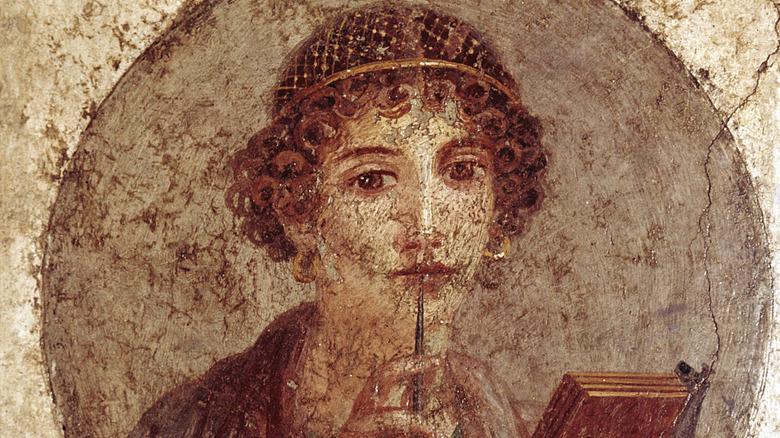The Real Reason We Can't Find Sappho's Lost Poems
"Who, O / Sappho, is wronging you? / For if she flees, soon she will pursue / If she refuses gifts, rather will she give them / If she does not love, soon she will love / even unwilling" (posted at the Brooklyn Museum).
This gorgeously written (and excellently translated) poetry belongs to Sappho, an ancient Greek poet from the island of Lesbos about whom we know very little. Her voice stirs the soul as often as it stirs modern, academic debate. Queer icon, censored talent, gifted voice: All these labels and more have been attributed to Sappho in the millennia since her death.
Why such controversy and debate? The above set of lines from "Ode to Aphrodite," written within Sappho's lifetime (possibly 625-570 BCE), comes from the only complete poem we have out of her entire, monumental output. A nine-volume edition of all of her works was compiled and published in the third century BCE, centuries after her death, and now we've got no more than 700 fragmented lines total, as the Brooklyn Museum explains. And this from someone once called "the poetess," counterpart to "the poet" Homer, and whose face used to be minted on currency, as the Poetry Foundation says. This from someone whom Plato called the "tenth Muse," equal to the nine goddesses of the arts and daughters of Zeus, who invented her own poetic meter we call "Sapphic meter," per Poets. What could have happened to wipe out the work of such a renowned poet?
Censored by the medieval church?
Christian censorship is the big, dramatic, conspiratorial reason that folks love to cite regarding the disappearance of Sappho's poetry, as Tales of Times Forgotten explains. It was too sexually explicit, some say, or repressed because it was just "too gay." Pope Gregory VII (1015-1085 CE) ordered it all incinerated in 1073 CE, as French scholar Joseph Justus Scaliger (1540–1609 CE) claimed. This theory — if it can be called that — got so much traction that our modern word "lesbian" comes from Sappho's birthplace, Lesbos. The adjective "sapphic" also comes directly from Sappho's name.
It's true that Lesbos contained a strong community of women committed to Aphrodite and Eros, and that poems such as the aforementioned "Ode to Aphrodite" contain implied homosexuality. In a more general sense, Sappho tended to write about love from a personal perspective. It's also true that homosexual relationships in ancient Greece were not a big deal. Beyond that, Sappho likely grew up in a wealthy household, attended school and learned poetry, music, dance, and more, as the Brooklyn Museum states.
The leap from this assemblage of facts to "Sappho was gay, therefore persecuted by the pope" is complete speculation. Poetry from others like the Roman poet Marcus Valerius Martialis (38–104 CE) was yikes-level sexually explicit, and the church still did its best to preserve it and all such ancient documents. Characterizing Sappho as a victimized lesbian reflects little more than modern hang-ups and historical anachronisms.
Poor record-keeping for an obscure dialect?
The real reasons behind Sappho's lost poetry are far more mundane, and exasperatingly predictable (in hindsight). As Tales of Times Forgotten summarizes, Sappho was at the forefront of an historical shift from epic poetry to lyric poetry. Epic poetry like "The Iliad" and "The Odyssey" featured tales of gods, heroes, and adventures. Lyric poetry like Sappho's was about expressing personal feelings. Her work was also intended to be performed with a lyre (hence the term "lyric," as Poets says).
By the time "late antiquity" rolled around — the transition from the Roman empire to the early medieval ages (third-seventh centuries, give or take) — trends turned away from lyric poetry and back to the study of rhetoric and the classics like Plato or Aristotle. Historians of the time transferred works on papyrus to newer formats, and it's likely Sappho's work wasn't at the top of their list. And back then, whatever wasn't copied by hand, book by book, vanished forever. Sappho's poetry was all but gone even by the 12th century.
The final nail in the coffin was Sappho's dialect. She wrote everything in Greek Aeolian, which was obscure even back when she lived. Aeolian was full of letters, sounds, allusions, and expressions not found anywhere else. Even by the second century, writers such as Lucius Apuleius Madaurensis (124–170 CE) commented on how hard it was to understand Sappho, similar to how some nowadays find Shakespeare's Renaissance English difficult to understand.


